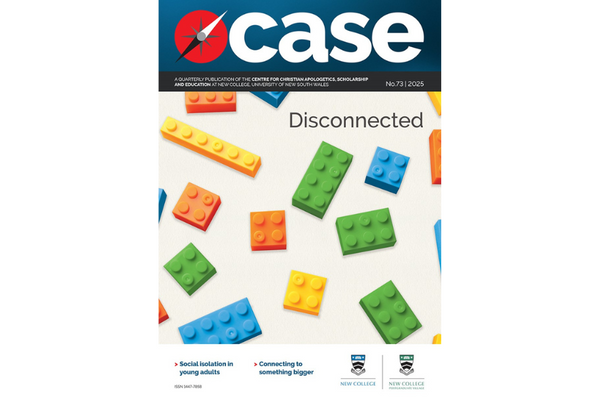Singing together is good!

The Bible is full of admonishments to sing. For example, Psalm 149:1 says, ‘Praise the Lord. Sing to the Lord a new song, His praise in the assembly of His faithful people’, while Paul writes to the Colossians, ‘Let the word of Christ dwell among you richly as you teach and admonish one another with all wisdom through psalms, hymns, and songs of the Spirit, singing to God with gratitude in your hearts’ (Colossians 3:16). It’s an interesting question to consider why singing is so central to biblical teaching and Christian tradition.
There are some obvious reasons why singing should be a part of our act of worship. It is a way to remember the goodness of God and to proclaim these truths together, in unity. It can also be easier to remember scripture when we learn it in song form. Many people find music facilitates transcendent experiences that take them out of everyday life. These experiences are focused on strengthening our relationship to God. But science has uncovered still more benefits that we may not have considered, which focus on strengthening the relationships amongst each other, as members of a faith community.
When exploring collective music-making, a fundamental question is whether humans are innately musical. While many people don’t consider themselves musical and the thought of singing in public calls forth feelings of alarm associated with embarrassment and humiliation, the truth is humans are born with incredible musical capabilities; we are wired for music. Infants’ musical discernment is on par with adults’; they are born with the capacity to decode complex rhythm and pitch, and are highly responsive to music, more so than to speech. There are even indications that newborns have preferences for musical styles that they were exposed to in utero. Music engagement activates multiple regions of the brain, including emotions, memory, rhythm and pitch discernment, and the reward centres of the brain, with indications that some of these pathways are exclusive to music (rather than shared with other processes, like language). Despite our feelings to the contrary, our musical capabilities are innate and do not require training.
Understanding why humans are musical has led to extensive research with community choirs, the nearest proxy we have to untrained communal music-making that is assumed to reflect the earliest forms of music. First, there is increasing agreement that music is what is known as affective messaging—it carries emotion. Today, when we can access nearly any song whenever we want it, many people use music as a form of emotion regulation. Sometimes this means listening to something that aligns with your current mood; listening to sad music when you are feeling sad both affirms that emotion state but also provides pleasure in the sadness. People also use music to change their emotion state, for example to move themselves into a more energetic state or to reduce negative emotions and increase more positive ones.
When we sing together, the emotion expressed in the music can become ‘contagious’, creating a shared emotional experience across a group. These experiences of positive emotions may provide important health and wellbeing benefits; positive emotion states are associated with a more positive outlook on the future, improved health, better psychological resilience, and even longevity. Another benefit of this contagion effect in a church or faith setting is that people can feel more connected to one another and unified.
This sense of unity is an important point. People who sing together often also feel a strong sense of bonding, and there are even indications that joint music-making can increase pro-social behaviours, like empathy and cooperation. This in turn can lead to greater care for one another. Musical experiences may even create a greater sense of empathy for unknown people, even through a simple intervention of engaged listening to music from other cultures, leading to sacrificial acts of compassion and increasing altruism. It’s worth noting, however, that music can also be used to create exclusivity—something most churches want to avoid. Even simple practices like providing the words to music rather than assuming everyone knows them or avoiding songs with unfamiliar language use can make a difference.
There may be still another key benefit of integrating music into our shared expressions of faith—it may support a collection of people to work together in shared action. ‘Moral emotions’ is its own subset of emotion studies; their role in facilitating unselfish action is critical. Emotions act as a facilitator of decision-making and action. For example, when something gives us a positive emotional response, like altruism we are more likely to engage in it again. What we consider negative emotions, like anger or guilt can prompt unselfish behaviours like opposing unethical practices, for example. When these emotions are shared across a group that feels a sense of closeness and unity, the group is prepped to take coordinated action, subsuming individual desires and focusing on the good of the whole, or even other people in need external to the group. It could very well be that music plays a critical role in supporting us to work together, and for faith communities this is critical in our call to be the body of Christ (1 Corinthians 12:12-27).
Integrating music into our faith communities, then, has lots of benefits over and above relating to God through song—shared and positive emotions, a sense of togetherness, an increase in prosocial behaviours like empathy and helping one another, promoting collective action, and perhaps even greater concern for people who are suffering whom we don’t even know. With these insights, it’s no wonder that music and worship are so encouraged in the Bible.
Dr Susan Maury examined singing as a group process in her PhD thesis. She currently works in preventative health.
Leave a comment
Comments will be approved before showing up.



